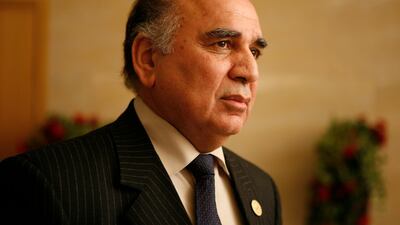Kurdistan's top political party nominated Fuad Hussein as their candidate for Iraq's presidency, aligning him against former deputy Prime Minister Barham Salih for the largely ceremonial post.
The Democratic Party of Kurdistan (KDP) nominated Mr Hussein, a former chief of staff to the previous Kurdish President Masoud Barzani, on Monday. The rival Patriotic Union of Kurdistan (PUK) named Mr Salih as their choice last week, asserting that the ceremonial post should be held by one of its members.
An informal power sharing agreement in Iraq divides top roles in government between the predominant ethnosectarian groups: the prime minister is a Shiite Arab; the speaker of parliament a Sunni Arab; and the president a Kurd.
The two dominant Kurdish political parties have been unable to agree on a nomination for the president, something that threatens their usually united front in Baghdad.
"We are optimistic to reach an agreement to have one Kurdish candidate," KDP member Janghis Awakalay said. "We believe he [Fuad Hussein] has a better chance at winning and serving the nation as he is the stronger candidate."
Parliament is expected to vote for the president on October 3.
The PUK nominated Mr Salih last Wednesday. He had left the party last year to form his own political party, the Coalition for Democracy and Justice (CDJ).
Who is Fuad Hussein?
Mr Hussein was the chief of staff to former President Barzani.
He was born in the town of Khanaqin but lived much of his life in Baghdad and the Netherlands. He has a doctorate in international relations.
He has previously said he believes the dissolution of Iraq and the formation of a Kurdish state is "inevitable."
"We believe his experiences can resolve the outstanding issues between KRG and federal government and safeguard the constitution," Mr Awakalay told The National.
The KDP is currently the largest political party in the autonomous Kurdistan Region of Iraq. It won 25 seats in May's national elections, and a presidential candidate must have its approval before being elected by parliament in Baghdad.
"Mr Hussein is an independent figure, who is capable and enjoys good relations with all political parties in Kurdistan and also in Iraq. He is experienced and has worked for the Kurdish cause and with the Iraqi opposition against the former regime," a Kurdish official told The National, speaking on condition of anonymity.
The PUK has held the presidency since 2005, first the late Jalal Talabani and then current president Fuad Masum.
"The KDP believes that 12 years is enough for the PUK to have this position, and specially with election results, the KDP sees itself entitled to have this position with someone who is capable and can deliver and play a positive role," the official said.
In addition to Mr Hussein's nomination there are six other candidates, including a woman, running for the post.
Sarwa Abdul Wahid announced on Sunday her candidacy for the post, making her the first woman to run for the position in Iraq. Ms Wahid was a critic of the region's independent referendum last September.
Two other Kurds – former Goran MP Sardar Abdullah and Iraq’s ambassador to Rome Omar Barzinji – have also nominated themselves.
_________
Read more:
Kurds nominate Barham Salih for Iraqi presidency
Iraqi ambassador to Iran summoned for 'misconduct'
US calls for 'moderate, nationalist' government ahead of Iraqi parliament opening
_________


